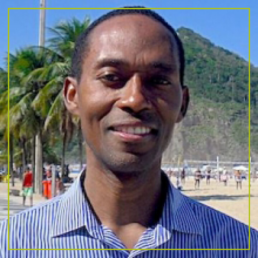Black History Month is a time to recognize Black contributions and people we admire. For Boann, we need look no further than our own team for Black leadership we look up to. We want to share with you some thoughts from the minds who influence us, in their own words.
Peter Scott is a Lecturer at OCAD University and a member of Boann’s Advisory Council.
In honour of Black History Month, Peter shared his reflections with us on advancing equity for Black communities in Canada through impact investing and beyond.
The views presented here are his own.
I see it as a very grassroots approach. But I also see it as a systemic approach.
How has your experience as a Black man influenced your approach to impact investing?
My experiences have led me to approach impact investing from the perspective of innovation. What might be the innovative contribution that I make as a researcher, as an educator, as a design thinker and social entrepreneur — knowing what I know as a Black person — to imagining new types of financial products and services?
I want to create tools and explore concepts and frameworks that can promote awareness of impact investing, and to work with Black communities to explore alternative ways of creating value and defining value. And by doing that, to contribute to Black communities being better served by and able to meaningfully participate in the larger economic systems and structures we have. So I see it as a very grassroots approach. But I also see it as a systemic approach.
How would you like to see Boann support Black leadership and success through its work?
First, at a systems level — I want to see Boann looking outward into social systems and infrastructures, thinking into the long-term future, and being bold. What are the emerging infrastructure trends in social finance that might enable new financial products and services, and that can be used as a beacon to guide future systemic changes? Maybe that means actually building infrastructure that has a longevity to it, maybe it means a BIPOC bank that is counteracting how BIPOC communities have historically existed within our economic systems.
The second is about leadership. I think that Boann’s Advisory Council is walking the talk. That starts with representation, but it doesn’t stop there. It also means having conversations and creating opportunities for thought leadership like what we’re doing right now — for people to listen to and learn from the ideas of people who have lived experience within underrepresented communities.
Lastly, of course, is how funds are distributed. When we think about the kinds of financial products and services that BIPOC people need both now and in the future, we have to recognize that those products and services have not yet been ideated and developed, because there is a deficit of knowledge within financial institutions when it comes to identifying and responding to those needs. There’s a lot of work to be done to build that understanding and remove barriers so that these things can emerge. The funds that Boann has represent some of these enabling processes.
What are the emerging infrastructure trends in social finance that might enable new financial products and services, and that can be used as a beacon to guide future systemic changes?
“Education got us into this mess and it will get us out.”
What would you recommend everyone learn something about to better understand the Black experience in Canada? (This can be a person, place, event, book recommendation, etc.)
There is a gentleman by the name of William Wells Brown. He was a Black person in the 19th century United States — but you can imagine the parallels in Canada — around the same time as Frederick Douglass, one of the most famous Black abolitionists, scholars and writers. Wells Brown was a fiction writer, and after emancipation, he bought freedom for himself and created this idea around wildcard banking in his fiction. He used that idea to take people on a journey of how to look at the world through banking, to understand how Black folks navigated the world through money in light of slavery, and how punishing and discriminatory banks can be towards Black people. It offers a history lesson on how Black people in America had innovative ways of subverting the economic systems that worked against them and commodified them. People like William Wells Brown and Frederick Douglass are speaking to us generationally.
Education is extremely important — and a double-edged sword. Murray Sinclair said “education got us into this mess and it will get us out”. Education is a healing thing. Knowledge is a healing thing. Initiatives like this where Boann is spotlighting Black leaders creates opportunity for that.
